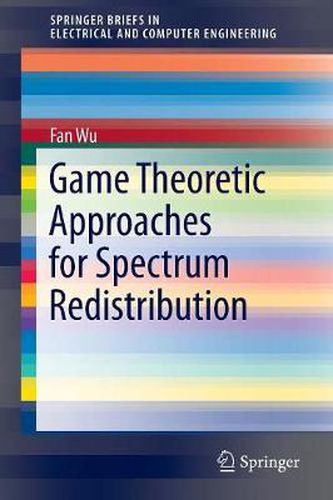Readings Newsletter
Become a Readings Member to make your shopping experience even easier.
Sign in or sign up for free!
You’re not far away from qualifying for FREE standard shipping within Australia
You’ve qualified for FREE standard shipping within Australia
The cart is loading…






This title is printed to order. This book may have been self-published. If so, we cannot guarantee the quality of the content. In the main most books will have gone through the editing process however some may not. We therefore suggest that you be aware of this before ordering this book. If in doubt check either the author or publisher’s details as we are unable to accept any returns unless they are faulty. Please contact us if you have any questions.
This brief examines issues of spectrum allocation for the limited resources of radio spectrum. It uses a game-theoretic perspective, in which the nodes in the wireless network are rational and always pursue their own objectives. It provides a systematic study of the approaches that can guarantee the system’s convergence at an equilibrium state, in which the system performance is optimal or sub-optimal. The author provides a short tutorial on game theory, explains game-theoretic channel allocation in clique and in multi-hop wireless networks and explores challenges in designing game-theoretic mechanisms for dynamic channel redistribution. Since designing a completely secure mechanism is extremely expensive or impossible in most of distributed autonomous systems, it is more beneficial to study misbehavior of the nodes and develop light-weighted game-theoretic channel allocation mechanisms. With a mix of theoretical and hands-on information, the brief traces the concepts of game theory, the current state of spectrum allocation in wireless networks and future competition for resources. Thorough yet accessible, the content is ideal for researchers and practitioners working on spectrum redistribution. It is also a helpful resource for researchers and advanced-level students interested in game theory and wireless communications.
$9.00 standard shipping within Australia
FREE standard shipping within Australia for orders over $100.00
Express & International shipping calculated at checkout
This title is printed to order. This book may have been self-published. If so, we cannot guarantee the quality of the content. In the main most books will have gone through the editing process however some may not. We therefore suggest that you be aware of this before ordering this book. If in doubt check either the author or publisher’s details as we are unable to accept any returns unless they are faulty. Please contact us if you have any questions.
This brief examines issues of spectrum allocation for the limited resources of radio spectrum. It uses a game-theoretic perspective, in which the nodes in the wireless network are rational and always pursue their own objectives. It provides a systematic study of the approaches that can guarantee the system’s convergence at an equilibrium state, in which the system performance is optimal or sub-optimal. The author provides a short tutorial on game theory, explains game-theoretic channel allocation in clique and in multi-hop wireless networks and explores challenges in designing game-theoretic mechanisms for dynamic channel redistribution. Since designing a completely secure mechanism is extremely expensive or impossible in most of distributed autonomous systems, it is more beneficial to study misbehavior of the nodes and develop light-weighted game-theoretic channel allocation mechanisms. With a mix of theoretical and hands-on information, the brief traces the concepts of game theory, the current state of spectrum allocation in wireless networks and future competition for resources. Thorough yet accessible, the content is ideal for researchers and practitioners working on spectrum redistribution. It is also a helpful resource for researchers and advanced-level students interested in game theory and wireless communications.